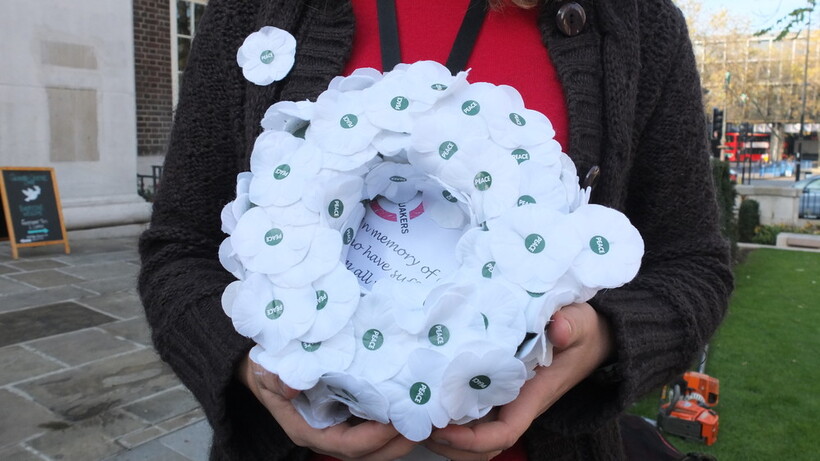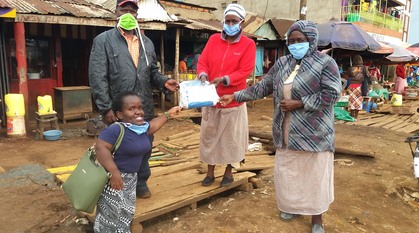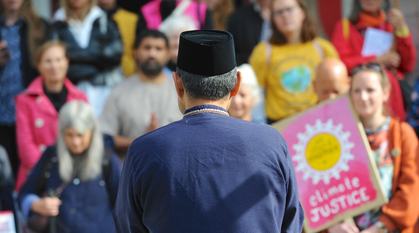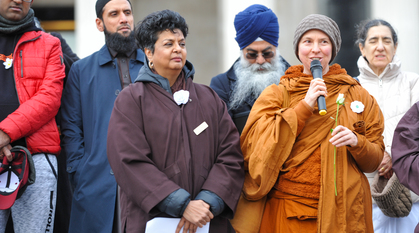Bread Not Bombs: honouring those killed in war by preventing future war
Dixe Wills reflects on the old and still relevant messages: 'bread not bombs', and to honour those killed in war by ending all wars.

Near the desk I usually sit at when working in Friends House, there's a poster featuring a wheatsheaf that reads: 'The hungry need bread not bombs. Stop the arms trade.' When I leave at the end of the day, I pass another poster. This one bears the photo of a young African girl drinking from a plastic bowl. It declares 'People need water not weapons.'
The need for the staples of life such as bread and water – as opposed to the instruments that bring death – might seem an obvious one to Friends. However, one glance at the news over the past year or so is enough to know that it's not a truth that is universally acknowledged. From the mouths of politicians, military leaders and media pundits, the cry is to spend spend spend ever spiralling amounts of money on weaponry – all in the name of 'defence', of course, or even, absurdly, 'economic growth' (which has long since been shown to be a myth). And all the while the voices that call for 'bread not bombs' or 'water not weapons' are drowned out by this frenzied rattling of sabres.
The approach of Remembrance Week seems to have done nothing to quell this clamour. The original intention of Armistice Day – to remember those killed in the Great War – came with the understanding that the best way of honouring 'the fallen' was to ensure that the global conflagration that had claimed them was indeed 'the war to end all wars'.
White poppies keeping the message alive
Another world war was, of course, not long in coming, along with countless other armed conflicts. Over the decades, the underlying 'never again' message of Remembrance Day might have been entirely lost were it not for members of the Co-operative Women's Guild launching the white poppy in the 1930s to keep that spirit alive. Although those white poppies – promoted by the Peace Pledge Union – are still in evidence today, all too often Remembrance Day services come with an unspoken affirmation that war is inevitable and that the cost in human lives is merely a lamentable consequence. Indeed, with flag-waving nationalism sweeping the country, there's a danger that the 'glorious dead' might be used as a source of national pride and a justification for 'strengthening the nation' through an increase in its armed capabilities.
By contrast, a report just released by the UN Secretary-General António Guterres raises the alarm that the current escalation in military spending around the world will inevitably have a negative impact on the UN's Sustainable Development Goals (SDGs), posing 'a serious threat to humanity's future'.
The UN report, entitled The security we need: Rebalancing military spending for a sustainable and peaceful future, observes that, 'According to the Stockholm International Peace Research Institute, a staggering $2.7 trillion was spent on militaries in 2024. This marks a more than 9% jump from the previous year—the steepest increase since the Cold War and the tenth consecutive year of growth. This unprecedented military spending surge is occurring as global security deteriorates and progress on the Sustainable Development Goals (SDGs) – the world's blueprint for a more equitable future – is falling short.'
Security comes from peacebuilding and sustainable development
The report pushes back on the prevailing narrative that peace can only be obtained by increased spending on weaponry. Instead, it makes a powerful argument for that money to be spent on peacebuilding and sustainable development.
And let us not, of course, forget the devastating effect that the world's militaries have on the climate, producing at least 5.5% of the planet's greenhouse gases. According to the Conflict and Environment Observatory, if all militaries were combined and treated as a nation, their carbon footprint would be larger than every other country on Earth aside from China, the US and India. A video released by the UN to accompany 'The Security We Need' states that reinvesting just 15% of the money currently spent on the world's militaries 'would be more than enough to cover the annual cost of climate change adaptation in developing countries'.
Calling for 'bread not bombs' is not a new message. The wheatsheaf poster near my desk is, in fact, a reproduction of one created by Quaker Peace Service in 1974.
This Remembrance Day, it behoves Quakers to think creatively to ensure that, 51 years later, that message is not only heard but is also too compelling to be ignored any longer.
That is, surely, the best way to honour those killed by war.


